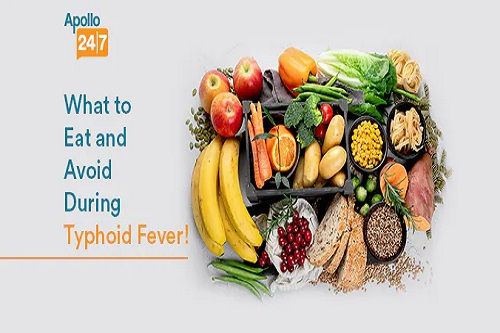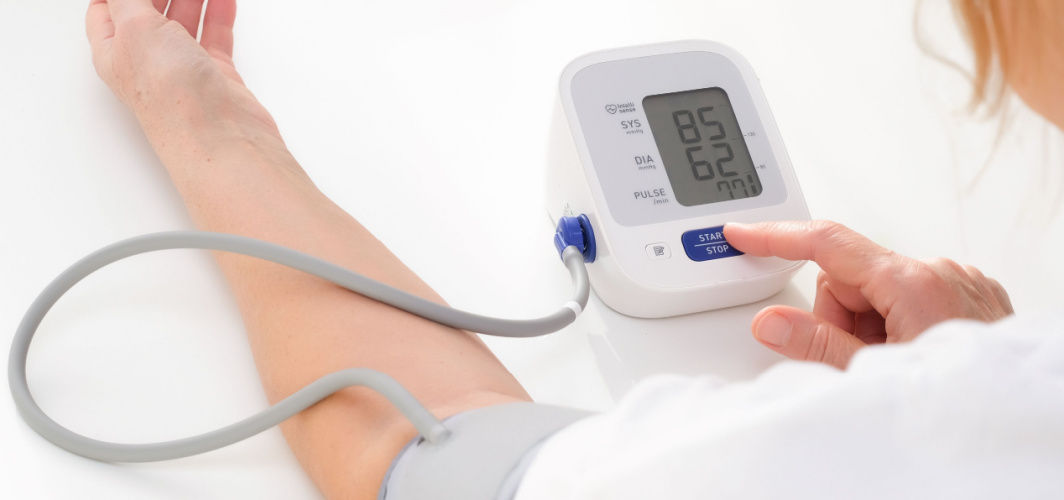General Health
Typhoid Diet: What To Eat and Avoid in Typhoid?
7 min read
By Apollo 24|7, Published on - 03 August 2022, Updated on - 18 August 2023
Share this article
0
98 likes

Monsoon is often synonymous with a wide range of diseases such as cold, infections, allergies, fever, and so on with the chief among them being the- “Typhoid Fever”.
Typhoid fever is an intense form of infectious disease caused by consuming contaminated food and water that may be infected by ‘salmonella typhi bacteria’. Since the bacteria directly affects the digestive system and soon flows into the bloodstream, typhoid drains a patient’s body by inducing high fever, vomiting, loose motions, muscle pain, headache, and loss of appetite. And while the antibiotic course is still the best treatment for typhoid, a good diet is extremely important to combat weakness and recover faster.
This article sums up the best diet to recover after typhoid along with some precautions to avoid further infection or relapse.
Also read: Is Your Monsoon Fever a Sign of Typhoid?
What to Eat During Typhoid Fever?
Best fruits to give a quick energy in typhoid fever
Fruits contain water, essential minerals and vitamins. This is why they are essential to combat dehydration and give a quick dose of energy. Fruits particularly best for typhoid are those that are rich in water content such as watermelon, sweet melon, grapes, apricots etc.
A bowl of ripe bananas, papayas, apples, guavas, sapodillas (chiku) and mangoes would do equally well.
However, note that the number of fruits should not exceed one so that it is not heavy on the stomach and is easily digestible. Also, wash your fruits thoroughly and peel their skin to ease digestibility and cancel any risk of bad bacteria.
Soups for quick recovery from typhoid fever
There is nothing like having a bowl of soup every day during typhoid fever. Soups are nutrient-rich, easy to gulp and increase appetite in people who are experiencing no taste due to fever and malaise. One can consume chicken soup, mushroom soup, mixed vegetable soup and tomato soup.
However, remember to avoid corn flour in soups until loose motions and stomach bloating subside.
Steamed vegetables for easy digestion
Typhoid patients are recommended to avoid spicy and oily cooked vegetables. Instead, have boiled vegetables such as potatoes, carrots, beans, beetroots, green peas, baby corn, bell peppers and onions. Remember not to toss them in oil, butter or ghee. Rather, add lemon juice, black pepper and salt for taste.
Since these are both- easily digestible and equally nutritious, they’ll add to your quick recovery.
Proteins to prevent weight loss during typhoid fever
You need to take a sufficient amount of proteins to prevent weight loss and muscle loss during typhoid fever. Lentils, chicken, egg white, and cottage cheese, tofu, mushrooms can be taken in small quantities either in the form of soup ingredients or boiled form.
However, if you experience nausea after consuming these proteins then discontinue having them for a week and speak with your doctor.
Low-fat dairy products to balance calcium
Low-fat dairy products such as buttermilk and curd are extremely beneficial during typhoid. Make sure to have them once a day to fulfil your calcium intake. Typhoid patients can also have a cup of low-fat milk with cornflakes for breakfast provided the milk is pasteurised to avoid the risk of other infections.
If you are allergic to dairy or milk-based products, have a consultation with our dietitians and nutritionists, and get a customised typhoid diet chart.
Best juices to drink during typhoid fever
Typhoid diet recommends staying hydrated especially because one has loose motions, vomiting and loss of appetite. One needs to ensure they are hydrating themselves well to recoup from the infection and also flush out bacteria from the body. Coconut water, orange juice, mixed fruit juice, pomegranate juice, and watermelon juice along with 8 glasses of water daily helps in recovering faster.
However, it is advised to have either bottled water or boiled water during recovery to prevent the risk of re-infection. Also, make sure you are not drinking high sugar content juices as they could worsen diarrhoea.
ORS (Oral Rehydration Salt) to control dehydration
Since typhoid particularly disturbs the body’s digestive system and drains the body of its natural salts, hydrating the body and maintaining its salt balance becomes extremely important. The weakness felt due to fever, diarrhoea, and loss of appetite is best solved through a simple concoction of sugar, water, and salt, also known as ORS. The right balance of sugar and salt eventually helps you absorb the fluid better and balance the electrolyte deficit.
However, note that you use only boiled water for this concoction and clean your hands with soap and water regularly. Typhoid is contagious in nature and any carelessness with hygiene can multiply the infection’s severity not only in the patient but also risk the caregiver.
To know more details about what to eat for typhoid fever based on your overall health condition, consult with our general physicians and dietitians.
What Not to Eat During Typhoid?
Our doctors and nutritionists recommend a strict typhoid food diet for patients. The patients are urged to avoid or limit the intake of the following foods.
Saturated fats
Avoid having saturated fats such as ghee, oil, butter and spices.
Heavy meals, spicy and junk foods
Don’t eat heavy meals, junk and spicy foods such as hot peppers, burgers, doughnuts, fried chicken, onion rings, french fries, canned meats, and potato chips. These can get very heavy to digest and irritate the gastrointestinal tract thus risking heavy coughing.
Raw vegetables
Avoid taking raw vegetables like cauliflower, onions, cabbage, and broccoli. Instead, take nutrient-rich home-cooked meals every 2-3 hours along with plenty of fluids to compensate for fluid loss from the body.
Also Read: Easy and Effective Tips To Prevent 7 Most Common Monsoon Diseases
Frequently Asked Questions Regarding Typhoid Diet
1. Can I eat chapati in typhoid?
Yes, you can! However, chapati can sometimes be harder to digest. In case your body does not respond well to chapati, switch to boiled white rice along with some daal, and then gradually move to chapati as you feel better!
2. Can I have milk in typhoid fever?
Yes, milk is a great source of calcium and if you have been having it since your childhood, you can have it in typhoid too. However, make sure it is pasteurised and taken in only less quantities. Also, milk can be slightly heavier to digest in typhoid. In case your body does not respond well to typhoid, discontinue immediately and shift to lighter, water-based fluids such as coconut water or juices.
3. Can I breastfeed during typhoid?
Yes, you can breastfeed during typhoid. Breastfeeding does not transfer typhoid germs. However, it may transfer some quantities of antibiotics. Therefore, it is advisable to feed in smaller amounts.
4. Can I drink alcohol in typhoid?
No. It is not advised to drink alcohol even if you are not suffering from typhoid. Alcohol can irritate your digestive tract and cause ulcers, which can lead to vomiting and other health concerns. To understand better how alcohol can affect your body in typhoid, consult the best doctor near you.
Takeaway
While precaution is always better than cure, a typhoid infection may not always be preventable. Therefore, if you suspect any such contraction, begin with the typhoid diet plan immediately along with medicines prescribed by your doctor to help in quick recovery.
You are recommended to take fruits, boiled vegetables, soups, bottled water and low-fat dairy products to counter the infection. However, if you are having excessive nausea, or loss of appetite and cannot eat anything, do not hesitate to connect with our expert dieticians. They will ensure a customised typhoid diet chart which will help ease your discomfort.
Want a customised diet chart?
Medically Reviewed By Dr Dhanunjay Reddy B
General Health
Leave Comment
Recommended for you

General Health
Even Non-Alcoholics Are Not Immune to Liver Diseases
While liver problems are mostly linked to alcohol intake, people who don’t drink can also experience liver dysfunction due to a condition called Non-Alcoholic Fatty Liver Disease.

General Health
Step-By-Step Guide: How To Measure Blood Pressure At Home
Monitoring blood pressure at home is crucial for cardiovascular health. Understanding systolic and diastolic pressure, following proper measurement techniques, and knowing the implications of high and low blood pressure allow individuals to make informed decisions and maintain optimal levels for overall well-being.

General Health
How To Choose The Right Online Pharmacy?
Navigate the world of online pharmacies effectively. Explore vital factors to consider when selecting the ideal option for your needs.
Subscribe
Sign up for our free Health Library Daily Newsletter
Get doctor-approved health tips, news, and more.
Visual Stories

Could There Be More to Your Snore?
Tap to continue exploring
Recommended for you

General Health
Even Non-Alcoholics Are Not Immune to Liver Diseases
While liver problems are mostly linked to alcohol intake, people who don’t drink can also experience liver dysfunction due to a condition called Non-Alcoholic Fatty Liver Disease.

General Health
Step-By-Step Guide: How To Measure Blood Pressure At Home
Monitoring blood pressure at home is crucial for cardiovascular health. Understanding systolic and diastolic pressure, following proper measurement techniques, and knowing the implications of high and low blood pressure allow individuals to make informed decisions and maintain optimal levels for overall well-being.

General Health
How To Choose The Right Online Pharmacy?
Navigate the world of online pharmacies effectively. Explore vital factors to consider when selecting the ideal option for your needs.